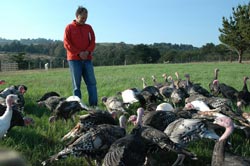We caught up with Nicolette Hahn Niman, author of the new book, Righteous Porkchop: Finding a Life and Good Food Beyond Factory Farms during her visit at a recent Chef Collaborative event in Portland, Oregon. Niman, an environmental attorney, and livestock rancher (Niman Ranch), feels passionately that our food system is broken, and is working to shed light on the horrifying industry practices that have become commonplace, but largely unknown to the general public.
Addressing an audience comprised of fellow food activists, farmers, restaurant owners, and others in the sustainable food movement, Niman identified 5 commonly held myths about our industrial food system. Here are some brief notes from her talk:
1. The most environmental friendly diets are vegetarian in nature.It turns out, the way in which crops are grown, and the type of crops can have a significant effect upon contributions to climate change. For example, [wetland] rice production contributes up to 29% of the methane that is released into the atmosphere. Atmospheric concentrations of methane are far more destructive than equal concentrations of carbon dioxide.
2. Livestock production causes significant environmental problems, especially to climate change.It all depends on how and where animals are raised. CAFO’s, are environmentally destructive. They are also cruel and inhumane in the treatment of farm animals. Sustainable ranching practices greatly reduces environmental impacts including the release of greenhouse gas emissions.
3. Our current food system is here to stay; we have to do things this way in order to feed our own population, and help feed the rest of the world.It took decades to create this system, but there is nothing inherent about the food system that requires it can’t be changed. In fact, quite the opposite, it must change, not for political reasons, but because our planet can no longer sustain such destructive activities, and for moral reasons, too.
4. Economics favor the industrial agriculture model where economies of scale, along with production and distribution efficiencies keep food prices low.Federal subsidies, in particular the Farm Bill, favor a small percentage of large scale commodity farmers. Changing these subsidies to reward better farming and ranching practices that are humane and environmentally friendly would level the playing field—CAFO operations would no longer prove viable.
5. We need industrial food production to feed the world.The problem with hunger and starvation in the world is not due to an under supply of food. It’s more a distribution problem, and a food sovereignty issue. To the extent possible, nations should be encouraged to produce their own food and not rely solely upon international food markets to feed their own people. By the continued emphasis on increasing production yields, we ignore the environmental costs associated with industrial farming, and resulting lower profits for farmers. The food system favors large agribusiness interests, not most farmers and eaters.
Most of the videos featured on Cooking Up a Story were produced, filmed, and edited by Rebecca Gerendasy. Fred Gerendasy contributed as a writer to many of the posts and occasionally as the interviewer. Visit Rebecca Gerendasy Clay – Art and Fred Gerendasy Photography to see their current work.

